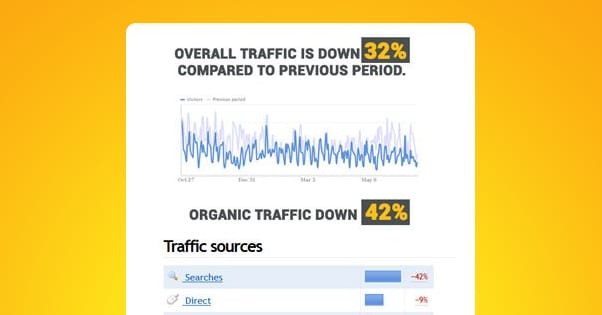Could Your Rankings Drop if You Stop Blogging Regularly?
Published by Drew Hendricks • Search Engine Optimization • Posted January 29, 2017 ContentPowered.com
ContentPowered.com
One of the number one pieces of advice we give new bloggers around here is to set up a consistent blogging schedule. Maybe you just post once every Wednesday. Maybe you set up a Monday-Wednesday-Friday schedule. Maybe you post five days a week, or seven. Maybe you have the staff and the content to handle posting twice a day, seven days a week. It doesn’t matter when or how often, as long as it’s consistent.
At the same time, it’s a constant struggle. I often see two very different reasons why bloggers stop blogging.
- “It’s not doing anything.” These bloggers have put a few weeks or a few months of effort into their blogs, and occasionally a few years, and have seen very little in the way of returns. They don’t see sales, they don’t see much traffic, and so they decide the blog is just an expense that’s doing nothing for them.
- “It’s doing enough already.” These bloggers have build a small or mid-sized community and have decided it can stand on its own. They get plenty of traffic and sales from their evergreen posts and their PPC ads, so why should they keep producing content?
In the first case, there is often some kind of problem with the blog in question. Maybe it’s thin content, or poorly written, or just doing poor quality versions of existing high quality content, so it never ranks well. There are a million reasons why a site might not rank, or why a blog might not convert. In fact, identifying the reason and helping solve it is a big part of our business here.
The second issue is one that confronts many established businesses, especially those going through a tough stretch and who want to cut down their costs. Blogs can be expensive, especially if you have to pay a stable of writers and the upkeep on various tools. It’s a tempting cost to cut, especially if an intentionally “missed” post or two shows very little of a drop in traffic.
So, what will happen if you stop blogging consistently? What if you still post, just every couple of weeks on an irregular schedule when you find something you’re passionate about covering?
Google’s Love for Freshness
The freshness of content is a ranking factor in Google search. It might not seem like it when you’re a casual user of Google, of course. A lot of results are from the last few years, and when researching SEO topics, a lot of times the top ranked content is from 2007, 2011, 2014, or what have you. It’s very common to find older content outranking newer content, but that’s not a real indication that freshness doesn’t matter. In fact, one of the best strategies for coming up with new content is to find high ranking but old content and one-up it. You’re not guaranteed to out-rank it immediately, since links hold of lot of sway, but freshness is a beneficial factor.
There’s also the web crawling aspect of freshness. The more often you update your page, the more often Google crawls it. This isn’t directly correlated to your search ranking, but it does give your page more agility. If a negative SEO attack hits you and you want to recover from it, you don’t want to have to wait two weeks to see any changes, you want to see them within days. If you post a new piece of content about something newsworthy, you want Google to index it today, not next week. The more frequently your site requires crawling, the more frequently Google will crawl it, and the more opportunity you have for adjusting your content and strategy to capture attention, and see the results fast enough to adapt before a surge of traffic is gone.
A Look at Data
Two years ago, a man named Robert Ryan decided to conduct an experiment. He ran a fairly good blog in the SEO/Social/WordPress niche, but he wanted to try out a case study. What he did was he stopped blogging entirely for a grand total of 251 days. That’s two thirds of a year, for those keeping count.
So what did he find?
- Traffic to the site, overall in aggregate, fell by 32%. A full third of the traffic his site had been getting in the previous eight months was gone by the time his experiment ended. That kind of trend in the opposite direction – a 32% growth over eight months – is something SEO professionals dream about and use to promote their services. This is no small drop in traffic.
- Organic traffic specifically – that is, traffic from Google and other search engines – dropped even more, by 42%. Google tends to devalue sites that stop updating, under the assumption that they’re abandoned. An abandoned site might be a resource but it’s not as valuable a resource as an active site, and users aren’t likely to want to form a community around an abandoned site.
- Other forms of traffic didn’t suffer as much. Links and direct traffic only declined by 9% each, while social media traffic actually increased slightly.
- His ranking dropped. As a site about WordPress development, he ranked #1 for “WordPress developer” in Google prior to the start of his experiment. By the end of his experiment, he had dropped all the way down to #6. As you know, the vast majority of search traffic goes to the top three results. Dropping from 1 to 6 is dropping from the average of 35% of the search share to a mere 5%.
This case study proves empirically that dropping your blog can and will tank your search ranking.
Now, there are a few questions you might raise about this.
First, there’s no way of knowing how fast the ranking and traffic dropped. Robert didn’t post the specific data on a month by month basis or anything. All we know is that in eight months the damage was potentially devastating.
Second, there’s no definitive information on how much effort he put in to keeping the site alive through other means. He mentions that he did in fact have other sources of conversions, probably paid advertising and social advertising as well as lingering traffic and links to evergreen content, but he doesn’t go over them. It’s safe to say that abandoning a blog entirely would have much more devastating consequences compared to just dropping content creation.
Third, at the end of the day, this is still just one experiment. It’s entirely possible that his data was a fluke, but the results are stark enough that I would not recommend trying the experiment yourself to see if it’s an exception to the rule. The consequences are just too dire.
The Numbers Game
One thing I always bring up about SEO is that, to a certain extent, it’s a game of numbers. Creating more blog posts more often means more content on your site. More content on your site means more opportunities to rank in search for more and more varied keywords. It also means more chances to be shared on social media. More chances to earn backlinks from other industry sites. More opportunities to build community, more chances to engage with influencers, and on and on.
There is a certain element of slowdown to this in the last couple of years. Some people believe the content arms race is dying out, and that creating fewer, higher quality pieces of content is better, because most traffic and recommendations now come from influencer marketing. This is true – it’s partially due to the content flood. I mean, 400 hours of video is uploaded to YouTube every single minute. 80 million photos are posted to Instagram every day. There’s so much content out there that we’re spoiled for choice, and we don’t just browse for it any more.
What we need are recommendations. We get recommendations from influencers, from social media acquaintances, and from highly trusted sites. However, in order to get recommendations, we need enough content to sate the influencers involved.
It’s a fact that not every piece of content is exceptional, and not every piece of content is going to go viral or even get a high level of traffic. Many pieces of content are relatively ignored, or used by a small and select group of users. Narrow niches and long tail keywords dominate search. How do you find these opportunities? You certainly can’t just write one post per month and hope that one does well. You need to write four, or eight, or sixteen posts per month, in the hopes that one or two of them do well. Not every piece of content can be a hit, but the more content you make, the more likely you are to hit.
More posts means more traffic coming in from more sources. More of all of that means more leads, and more leads mean more conversions, more sales, and more profit for your company.
In a very real sense, if you stop blogging, you lose all of that. If you stop producing content, or even taper it off too significantly and too sharply, you lose a lot of that incoming traffic. That 32% drop in traffic can mean the difference between making a profit or losing money for your business, depending on how slim the margins you work with happen to be.
Replacements for Blogging
Some of you might notice that this blog tapered off its content over the last few years. Not all that long ago, we were producing content on a daily basis rather than a weekly one. We dialed back to two posts per week, and then to one. However, that change was gradual, and at the same time, we increased the quality and volume of the content. Instead of 1,000 word posts, we jumped to 2,000+, which allowed us to start producing better content with more detail, more depth, and more value.
At the same time, producing less content allowed us to focus on other elements of the business and grow from other directions. While we’re spending less time on blogging directly, we can spend more on guest blogging for other sites, or on building additional product offerings, or on expanding our existing products.
There are other ways of making a business profitable, but the fact is that blogging is a very effective and, surprisingly, low cost method of getting those conversions. So, yes, you can successfully run a business with a low-volume blog, while focusing on other forms of incoming traffic to monetize.
In our own example, however, we still have maintained a consistent schedule. Once a week is still once a week, and it’s still valuable and important to maintain it. The end result is business growth, but that’s also not what the title of this post is asking about.
If we’re talking specifically about search engine ranking, it’s pretty clear that if you stop blogging dead in the water, or if you taper off too much and don’t maintain a consistent schedule, you’re going to lose rankings. You can go from one to six in your search ranking for your key terms. You simply have less and less fresh new value to provide to the world, and you’re dropped in ranking accordingly.
And here’s the thing. The longer you go without blogging, the worse off you’re going to be. That drop in ranking isn’t putting 6 at a floor, it’s just going to keep falling. Your site probably isn’t going to be delisted from the search index entirely, at least not so long as it maintains itself, but it’s going to fall. The farther it falls, the harder it is to compensate for lost value with other forms of marketing. You may be able to make it up with PPC and social media initially, but those will start to drop off after a few months, and after a year they won’t break even any more. Eventually you’ll have no choice but to pick a blog back up if you want to grow again.










I started blogging every day recently but I haven’t seen any increase yet. Hope to see a positive effect soon as i wait for SEO to kick in. (I used to blog 3 times a week)